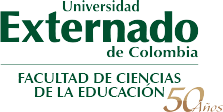12 de agosto de 2020
Challenges and Opportunities to research in English Language Teaching in times of Quarantine
Jairo Enrique Castañeda-Trujillo
The Schools of Education of various universities in Colombia have tried to strengthen the formative research of their undergraduate and graduate programs. The purpose of such research depends on factors such as the universities’ pedagogical orientation, the faculties’ research lines, and the tutors’ and the pupils’ personal epistemologies.
Regarding undergraduate and graduate programs in ELT, research has focused mainly on the experiences of pre-service and in-service students within the classroom, professional development processes, and language teachers’ identity, among other topics. Additionally, most researchers adopt a qualitative paradigm.
In regular times (without pandemic lockdowns), undergraduate and graduate student-researchers can have access to contexts and populations mostly without any inconvenience. However, in times of quarantine, many undergraduate and graduate students have had to take decisions regarding how to pursue their research projects. This fact poses challenges and opens the door to some opportunities concerning rethinking the goals of research in ELT.
On one hand, undergraduate and graduate students who were designing or have already developed their research projects in classrooms, had to take the difficult decision of changing their plans or modify the way to collect data. Observation techniques became unsuitable because the dynamics of the classrooms changed. Some research methods, such as action research, were limited because the planned activities had to be applied in the classroom and not in remote education environments. The materials designed for such classes, that intended to include innovative ways of teaching the language, had to be adapted and put on on-line servers to be distributed to pupils, forcing researchers to modify the contextualization of the problem and the goals of the investigation. For many student-researchers, these situations brought even more uncertainties about the research process and caused confusion and frustration.
On the other hand, other undergraduate and graduate students found that these changes, derived from confinement, had opened the door to think out of the box and to create opportunities to continue doing research. Revisiting the meaning of doing qualitative research could help researchers to readjust their research design according to the circumstances. Merriam and Tisdell (2016) explained that doing qualitative research implies centering the efforts in explaining, describing, analyzing, and understanding the social and human phenomena in their natural environment, avoiding the positivistic postures that intend establishing cause-effect relationships, perpetuating canonical theories through using them in the research and pedagogical designs, and objectifying the subject of the study by means of having them as mere informants. An example of the former is the misunderstanding about Action Research methods; this fact has lead researchers to think that the most important is to prove that a methodology is adequate for the pupils and that it produces excellent results in academic terms, causing a detachment and alienation of the subject (Granados-Beltrán, 2018).
If student-researchers reflect upon how to restructure their research studies, for sure, they will find the way to come back to the subject (participants/informants) they are researching about. Looking for alternative methods to have the participants of the research in the center of the research will contribute to foster social justice in education. Opening spaces to write about the participants’ truth, and include their voices will give them visibility and recognition (Castañeda-Trujillo, 2020).
To conclude, the quarantine and the transition to remote education have provided researchers with many opportunities to search for alternative ways to tackle ELT research in a more humane, comprehensive, and fair way.
____________________
References
Castañeda-Trujillo, J. E. (2020). Untangling initial English teaching education from pre-service teachers’ collaborative autoethnographies. In Methodological uncertainties of research in ELT education I (pp. 219-239). Bogotá, Colombia: Universidad Distrital Francisco José de Caldas.
Granados-Beltrán, C. (2018). Revisiting the need for critical research in undergraduate Colombian English language teaching. HOW, 25(1), 174-193. doi:https://doi.org/10.19183/how.25.1.355
Merriam, S., & Tisdell, E. (2016). Qualitative research: A guide to design and
implementation (4th ed.). San Francisco, CA: Jossey-Bass – A Wiley Brand.


